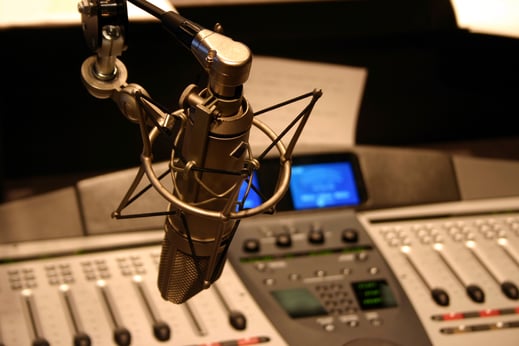Whether interacting with recruitment media actively or passively, anyone can be a job seeker. Creating content for any stage of the job seeking process is essential to meet job seekers wherever they are in their journey.
A bad commute or a rough experience at work, for example, may trigger a job seeker to take action. When they do, they’ll remember companies that had intriguing ads. This is where radio advertising excels.
A Nielsen survey found that radio reached 92% of American adults every week, proving that radio is a great way to reach listeners on the go. With radio reaching 84% of adults who plan to look for a job within the year, companies that leverage radio advertising with frequent and targeted campaigns can successfully attract and hire top talent.
Read on to learn how radio can benefit recruitment strategies and help companies attract top talent.
Why Advertise on the Radio?
Radio advertising is an upper-funnel awareness tactic that can be used to supplement other, more conversion-focused tactics. It’s a great way for businesses to spread the word that they’re hiring, while controlling messaging and effectively conveying their brand voice and identity to their audience. People can listen to the radio in their car, stream it on their phone, listen on their desktop at work, etc. – allowing companies to get in front of talent anywhere and at any time.
Due to its ubiquitous nature, radio also allows advertisers to cast a broad net, reaching audiences at scale. This makes it a particularly effective recruitment tool for entry-level positions.
Tip: The primary KPIs for digital radio advertising are impressions, reach, and frequency.
What to Consider When Creating Audio Advertisements
Radio advertising copy needs to entice the audience, carry the brand voice, and be consistent. Inconsistency between radio copy and copy used in other ad media can sour the candidate experience – often dissuading candidates from applying to a company. Advertisers should ensure the script and audio deliver a consistent message that resonates and piques their interest.

Writing Radio Advertising Copy
Advertisers have limited time – typically 30-60 seconds – to get their message across. That’s why it’s crucial to be clear and concise. Use that limited space to grab the audience’s attention and highlight the best parts of the role and organization.
The script should also end with a direct call to action (CTA), prompting listeners to visit a career site where they can learn more and apply. If the CTA is unclear, potential candidates are less likely to take action, which results in companies missing out on talent.
Tip: Some radio stations and streaming platforms, like Spotify, offer free or low-cost ad creation, providing advertisers a low barrier to entry.
URLs in Ad Copy
Because radio ads don’t require listeners to actively engage with a device and are often heard while driving, it’s a good idea to include a landing page URL in the CTA. Companies should ensure the URL is short and easy to remember.
Building Radio Advertising Campaigns
When planning a radio advertising campaign, keep in mind that repetition is key. A radio campaign should run for 30 days or longer to increase the likelihood that unique listeners will hear the ad multiple times. Repetition helps keep a brand at the forefront of listeners’ minds and can help usher them down the marketing funnel from awareness to action. The shorter the campaign flight, the less likely this becomes.
Frequency and repetition are also essential to turn the campaign into a successful long-term strategy because it ensures the ad is being heard by the right audience in the right place.
Tip: Since radio advertising is an awareness tactic, it’s best used in conjunction with bottom-funnel, conversion-focused tactics. Increased awareness keeps brands top-of-mind for job seekers when they’re ready to act, which ultimately helps maintain a robust talent pipeline.
Know the Audience
Finding the right platform on which to advertise starts with knowing the target audience. Understanding the job type and the most fitting candidate personas helps inform the tone and tenor of radio ads and where that audience is best reached. Hiring professionals should determine whether to run ads on traditional radio, digital radio, or a combination of the two and which stations and platforms they expect their audience to frequent. Then, tailor their ad copy to said audience.
Moving Forward
A strategic approach to hiring is crucial to success in today’s market. With companies needing to fill positions, there’s no better time to consider implementing new ideas into recruitment marketing plans.
However, it’s important to understand that radio advertising should be a long-term strategy, as with other types of awareness media. Radio recruitment is all about both frequency and having a consistent presence. Other advertisers are constantly vying for your audience’s attention and consideration – if your brand isn’t advertising in the radio space, you’re giving your competitors the edge.
If your company is looking to implement radio advertising to your recruitment strategies, we'd love to help!



